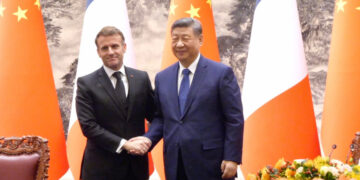Even the best designed industrial policies will fail if they go against the grain of institutions and if they cannot build on existing industrial strengths, write Angela Garcia Calvo and Bob Hancké.
Since 2021, the US, the European Union, Japan and Korea and, of course, China, have earmarked over $1 trillion to create or strengthen competitive advantage in new or existing industries deemed strategic and stimulate the green transition.
This is a lot of money, and while we have learned quite a bit about industrial policy since the Second World War – for example, that policies should not supplant but support markets and that centralised, top-down strategies do not work well, especially in highly uncertain tech sectors – there is one remarkable gap in our knowledge.
Which policies are likely to fail, and why, and why are some policies more likely to work? In a recent article, we have tried to think more systematically about this question, identify the conditions for industrial policy failure and success, and present a framework to help policymakers make more informed strategic decisions.
Why do we need industrial policies?
Governments in the rich countries engage in industrial policy for many reasons. That was true in the past, when industrial policy was mainly used for developmental purposes, and even during the neoliberal, small-state era, governments funded specific projects deemed important. It is again so today, when governments are committing vast sums to smoothen the industrial adjustment that accompanies the green transition, increased global competition, tariff wars, new geopolitical realities and the digitisation of everything.
The rationale for industrial policy is simple. Many of these new challenges and of the solutions that we can think of take the shape of market failures: they produce negative externalities or require the production of public goods; they include a hefty dose of time inconsistency, in which today’s losses appear massive and tomorrow’s gains uncertain and distant; and while they will produce (new) winners, the losers can often hold up adjustment for fear of being left behind, with its own undesirable economic and political consequences. Since markets cannot address market failures, industrial policies offer a solution.
In addition, while markets work reasonably well if they are stable, they are less powerful when the future is highly uncertain. If a technology is not well known, if demand for new products is unclear, or if geopolitics and policy remain mired in confusion, few are willing to bet on one outcome over another. Because of those existential uncertainties, private action remains slow and governments step in to unblock the animal instincts that drive a capitalist economy.
But industrial policies have their own problems. Often, they require, almost by definition, a leap into the unknown, and even the best prospective analysis is, at best, partial, usually concentrating on a few crucial elements such as science and innovation, technology transfer and skills, or direct subsidies. However necessary those may be, they tell only a small part of the story.
What we know…
Most studies of industrial policy concentrate on issues of administrative capacity, bureaucratic competence and policy design. While these aspects are undoubtedly important, they ignore a set of more structural prior conditions that set the stage for interventions: the articulation of the policies with the incentives embedded in the dominant institutional framework, and the existence of firms with the ability to identify and seize new market opportunities, otherwise known as ‘dynamic capabilities’.
If the policies go against the institutional logic and existing firms lack dynamic capabilities, industrial policies will almost certainly fail. The reason is simple: policies that support institution-building and those that provide entrepreneurial support for firms follow two distinct logics – the latter geared towards action in markets and the former towards intervention outside and beyond markets.
While a combination of market and non-market policies could work in theory, this is very difficult in practice because it requires extremely high levels of centralised coordination and an immense effort to reallocate national resources. If both conditions are already present, however, big-ticket industrial policy is probably unnecessary: things can work out quite well without a large-scale public intervention, and usually the institutional framework is already organised to gently support entrepreneurship.
But when only one of the two conditions is absent, industrial policies can come into play to produce the missing element. They can stimulate entrepreneurship or help overcome obstacles by redesigning institutions. Only then, we think, after these first-order conditions are met, do issues of policy design or administrative capacity matter.
The car industry – a failure in Britain, but a success in Germany
The evolution of the car industry in the UK and Germany before the transition to electric vehicles illustrates what happens when both conditions are simultaneously absent or present. In the 1970s and 1980s, Britain spent an inordinate amount of money on its failing car industry through nationalisation, mergers and state aid.
But these firms were already deeply uncompetitive – the reason for the nationalisations in the first place – and the policies failed to address the deep institutional shortcomings in industrial credit, industrial relations and skills. Eventually, the sector collapsed under its own weight and the Thatcher government sold what was left to foreign investors.
In Germany, almost the exact opposite happened during the 1980s and 1990s. When Japanese competition threatened German car manufacturers, German automakers improved their competitive position by moving up-market, building on the existing cooperative labour relations system, long-term credit provision and the progressive adjustment of powerful skill arrangements. The result: a highly competitive industry, secure for a generation – but without recourse to big-ticket industrial policies. The key elements for adjustment were already present, embedded, as it were, in the institutions and the practices and norms they reflected.
French nuclear success and computer failure
French nuclear power shows us what happens when policy pushes for developing an industry in which there are no firms with pre-existing dynamic capabilities, but against the background of a supportive institutional matrix. Led by the French utility company EDF, which actually had relatively little experience with cutting-edge technology at the time, the strategy leveraged France’s centralised, hierarchical decision-making structures, high levels of public involvement in critical infrastructure sectors, and tightly knit economic and policy elites into a new blend that engaged nuclear power as the energy source of the future.
Even though EDF and its suppliers had to follow a steep learning curve, the centralised, interconnected network built around engineers from the Grandes Ecoles enabled them to concentrate on a single technology. The political independence of the executive further meant that nuclear energy was not politically contested, as was the case elsewhere in Europe. In about a decade, dozens of nuclear plants were built and France’s energy mix went from almost three-quarters dependent on foreign sources to a 75% domestically produced share in the mid-1980s.
This was not a story of the perennially capable, deep-pocketed French state, however. At about the same time, the government instituted the Plan Calcul to produce French computers, which failed dramatically. The need for more decentralised, flatter lines of cooperation and decision-making in the computer sector sat uneasily with the more traditional, top-down model of French organisation. When there is neither alignment with existing institutions, nor dynamic capabilities, policies fail, even if the political will is strong.
Policy develops new rules – mobile phones and GSM
What if firms with dynamic capabilities exist but the broader institutional framework invites failure? To understand that, think of the case of early digital mobile phones in the 1980s. At the time, European telecommunication equipment producers were among the most technologically advanced. The problem they faced, with hindsight, was that developing digital mobile communications required that different types of expertise from across firms based in different countries were pooled, and that the resulting outputs reached sufficient scale to justify the effort.
But in such early stages, and with so much at stake, electronics firms were almost certain to compete on different technical standards. You may lose big, but win even bigger if things go your way, after all, and a dominant standard assures that. Moreover, since these electronics producers were linked to national telecom monopolies, it was unlikely that any individual standard developed in Europe could reach sufficient scale.
Through a series of targeted interventions, the European Commission transformed this dysfunctional national-level regime into a virtuous, supranational regime. At the centre of these interventions was the decision to adopt the Global System for Mobile Communications (GSM) standard across the EU. Mirroring the French nuclear case, the difference was made by institutional entrepreneurs who exploited existing company-level strengths, built institutional conditions for a market to emerge and grow, and for this new sector to consolidate.
Semiconductors
Today, we are entering a new era of industrial policy to address a series of new tensions that have arisen: climate change, the digital transition and potentially a new international trade regime. What does our framework suggest for those new industrial policies in two sectors: semiconductors and electric vehicles?
In a sister paper, that we titled “Mr Chips goes to Brussels”, we used our (then nascent) theory to critique the EU Chips Act. Our framework suggests that an expansive strategy for leading-edge semiconductor production makes little sense in Europe.
There are no existing European producers or designers of leading-edge chips, the appropriate skills and a dedicated innovation ecosystem are pretty much absent, new forms will face a steep learning curve, market leaders elsewhere are well entrenched and there is limited European demand for the chips in question. In fact, European efforts to carve a space in this market since 2013 have failed. Under these circumstances, Intel’s decision to abandon a projected €30 billion leading-edge chip manufacturing plant in Germany may have been a blessing in disguise.
An alternative strategy that focuses on conventional mature chips (i.e. nodes of 20nm or larger) is not a good idea either. Conventional mature chips are commodities and require little skilled labour – a configuration that is at odds with the prevailing European industrial strategies of a high-skill, high-wage economy. Moreover, several decades of increasingly open global markets have produced complex systems of trade interdependence, by and large built on specialisation and comparative advantages, which have kept prices low and supplies stable.
Instead, our framework suggests that the EU should concentrate on emerging semiconductor segments where no consolidated leaders exist yet, and where competitive advantages can leverage the capabilities of existing European producers, the existing high skills in the workforce and Europe’s world-class education system.
That is also exactly what IMEC’s Automotive Chiplet Program and the European Semiconductor Manufacturing Company joint venture are planning. Both build on existing European strengths in a crowded field and receive public funding from the EU and from national governments to expand their activities.
Electric vehicles
Electric batteries pose a different conundrum. There is little doubt that Europe has strong, competitive automotive firms, often propelled by powerful skills and innovation systems. However, electric battery development is the almost exclusive domain of new entrants with a different skillset in rechargeable batteries rather than vehicle design.
Moreover, uncertainty on the shape and size of electric vehicle markets and on the politics surrounding climate change dominates strategic thinking among car manufacturers. This uncertainty acts a bit like the standards war in mobile communications that we mentioned earlier. As a result of all this, the European car industry has dropped the ball recently, not once but twice, with its prevarications – and it is far from clear if it can recover given the considerable advantage that Chinese and Korean producers have built up in both battery technology and production.
The problem, we think, is that lift-off of the sector is predicated on the provision of a series of crucial public goods: charging infrastructure, more and stabler green electricity, and new public training programmes that combine low-level chemical, mechanical, electrical and computer engineering. Assuming government budgets can be configured to fund these investments, Europe could catch up in electric vehicles. But it does require a much deeper policy intervention than has been common in the industry, including tighter regulation to force manufacturers to play to their competitive strengths, to push the automotive sector over the line.
By way of short conclusion
Even the best designed industrial policies, voted for by enthusiastic politicians and implemented by the most competent administrators, will fail if they go against the grain of institutions and if they cannot build on existing industrial strengths. If the future is deeply uncertain, as it is in advanced chips or electric vehicles today, these two basic conditions will inform us of the feasibility of industrial policies. When they are present, industrial policies can succeed. Without them, they will certainly fail. That asymmetry is important when thinking about economic and industrial policies in the twenty-first century.
For more information, see the authors’ accompanying paper in Socio-Economic Review.
Note: This article gives the views of the authors, not the position of EUROPP – European Politics and Policy or the London School of Economics. Featured image credit: European Union






































Discussion about this post